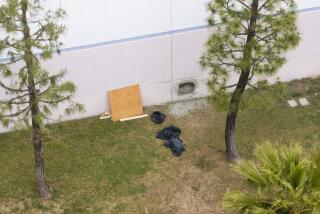Storage Space Scavengers Bet on Buried Treasures : Auctions: It’s usually just recyclable junk. But sometimes bidders get more than they bargained for.
- Share via
Bidders had just a moment before the auction began to shine flashlight beams into a 5-by-7-foot rental storage room, looking on the outside of cardboard boxes for clues to their contents.
It wasn’t until top bidder Ed Zaharoff had loaded the containers into his van that he noticed small, jagged holes in the bottoms of his new, boxed belongings. And it wasn’t until he started driving that he heard the screeches.
For $400, Zaharoff had become the proud owner of four boxes of rat families and the rags they called home.
Zaharoff is a “storage space scavenger,” one of hundreds who travel from auction to auction, their hunting grounds the storage rooms abandoned by owners for at least 60 days. The scavengers are willing to bid thousands of dollars, hoping to find hidden treasures in someone else’s leavings.
“People think they can get rich in this business,” said Zaharoff, a six-year veteran of the blind auctions. “I’m still working at Ralphs. I haven’t found a gold mine.”
What Zaharoff did find last week, for $2,300 at an auction of rent-delinquent storage rooms in Northridge, were three badly decayed human bodies. While police continue to investigate the dead people’s identities and their road into two steamer trunks and a box, Zaharoff and the other regulars continue to scavenge, hoping for luckier breaks.
Most of the time, they find boxes filled with people’s lives: tattered clothing and cloudy dishes, reams of papers and household knickknacks. It’s the sort of recyclable junk that might fetch a few dollars at a swap meet, enough, the treasure hunters hope, to at least reimburse them for their bid.
But sometimes they indeed find treasures, like the crayon box in a $400 room bought by Randi Cram of Whittier that hid a $4,000 Rolex watch.
The storage space auction game requires careful strategy. Labels can be deceptive; “crystal” can be a woman’s name or it can be the fancy label given to regular kitchen drinking glasses packed in newspaper. Boxes with factory brand names cannot be counted on to contain those items; gamblers all have memories about sealed boxes that promised Sony TVs or Apple computers, but were simply empty boxes.
“Something can look real good, and it ends up being the stuff of a bag man or something,” said Zaharoff, who was refunded the $2,300 he paid for the three bodies. “Sometimes people don’t know the value of something and they put it in storage. Happens all the time; that’s what we hope for.”
Myths of the trade--both horrible and grand--abound. Someone “back East” found a severed finger in a bag full of clothing. Someone “up North” paid $500 for a room and discovered a priceless painting.
The storage business owners have their own stories about the things people leave behind. Mary Vincent of Personal Storage Garages in North Hollywood recalled that one night a worker heard a pained howl coming from a storeroom. Someone had locked a dog inside.
At a Lancaster storage business, a former gold miner and amateur pilot filled his rented space with an airplane fuselage and a wooden wing, then disappeared. Business owner Liz Cordova never found him, or the rest of the plane.
Los Angeles police, too, have tales about uses for the nearly ideal hiding spaces. They regularly seek warrants to search storage rooms and occasionally find what they are seeking: drug labs, pornography, counterfeit money and other contraband, said Detective Tom Broad of the LAPD’s Devonshire Division.
Most of the regular storage-room gamblers--the ones who daily scour the papers for auction listings, subscribe to resellers’ newsletters and wear flashlights in their pockets and padlocks on their belts--say they are looking only to come out a little bit ahead. From time to time, antique dealers acknowledge, they do.
“I don’t think they’re going to find a Faberge Egg, but I do think the odds are pretty good that they’ll find something worth $100,” said Terry Kovel, the co-author of Kovels’ Antiques and Collectibles Price List. “But they have to be smart enough to recognize it--that’s the key--and then know how to sell it.”
Antique dealers derisively call the scavengers “pickers,” because they are willing to sift through the take. The bidders prefer to call themselves resellers, treasure hunters or gamblers.
And they have their own hierarchy. They refer to neophyte pickers as “newbies” and hope to drive them out of the game.
See someone who doesn’t look familiar? Mutter loudly about a worthless room’s good-looking haul, run the bidding high and then dump it on the newbie, leaving the newcomer with a room full of junk.
Spot a newbie struggling to load up heavy boxes? Let the person carry them out, then shout to friends about the great auction set to take place in minutes.
Competition, the gamblers know, pushes the bidding higher.
Ralph Hickey Jr. of Canoga Park has only been at the blind auction game for about six months. He works nights as a printer and saves many of his days for bidding, hauling and reselling storage-room contents.
At 9:30 on a recent morning, he was ready to bid on the one unit up for grabs at a U-Haul self-storage in Whittier. The last payment on the 10-by-10-foot room had been made in May, the storage manager said, and attempts to contact the room’s renter had been unsuccessful.
Hickey and about six other treasure hunters gathered around for the auctioneer’s usual pre-bidding speech.
Cash only. Personal photos and documents must be returned. No touching the room’s contents. No going inside before the bidding. No refunds. No guarantees.
When the manager opened the door, the gamblers gathered around it, training their lights on the booty: an old sewing machine, a rusty 10-speed bicycle, a mattress and the inevitable, but mysterious, boxes. In hopes the crates would contain items worthy of a swap meet, Hickey made the high bid, $350.
Peeking inside one, he spotted gift-wrapping. The others would remain unopened until he got home, another tenant of the scavenging game.
“No matter what you have, somebody will give you something for it, even if it’s a nickel or a quarter,” Hickey said. “It’s only worth what somebody will pay for it.”
More to Read
Sign up for The Wild
We’ll help you find the best places to hike, bike and run, as well as the perfect silent spots for meditation and yoga.
You may occasionally receive promotional content from the Los Angeles Times.






